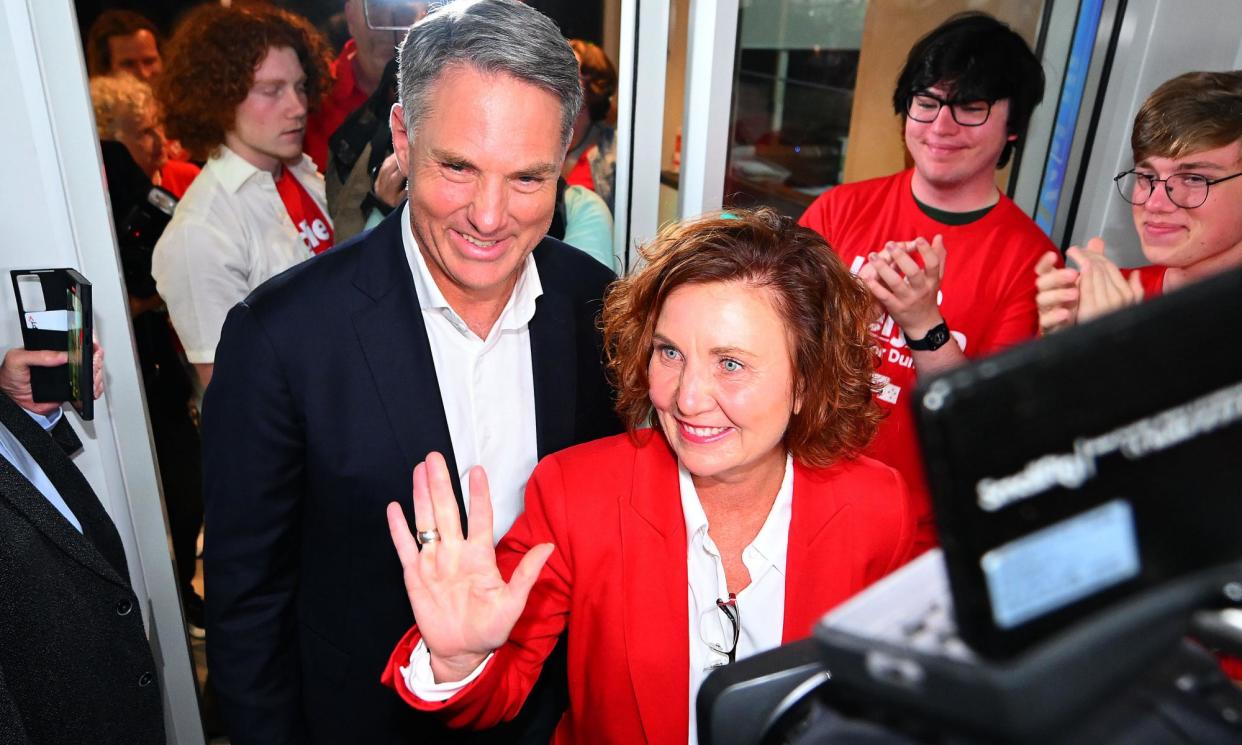Dunkley byelection: Labor’s Jodie Belyea triumphs but Liberals win modest swing

Peter Dutton’s Liberal party has won a modest swing in the Dunkley byelection but fallen short in the Labor seat vacated by the death of the popular local MP Peta Murphy.
The Liberal candidate, Nathan Conroy, has currently received 47.5% of the two-party preferred vote, a swing of more than 3% to the opposition, well short of the 6.3% swing required to win the seat off the Albanese government.
The deputy prime minister, Richard Marles, said Labor was increasingly confident of victory, and after 8.40pm the party declared it believed Jodie Belyea had won the seat. Conroy called Belyea shortly after to concede defeat.
Congratulations to Jodie Belyea on her victory in the Dunkley by-election and winning the honour of serving her local community in Federal Parliament.
Jodie ran a strong and positive campaign and she’ll work hard every day as a champion for Dunkley in Canberra. pic.twitter.com/GtjDrYwni7— Anthony Albanese (@AlboMP) March 2, 2024
Conroy told his supporters in Dunkley that the Liberals had “sent [Anthony] Albanese a message tonight”.
“Cost of living is in crisis, healthcare is in crisis, housing is in crisis … crime is on the rise, [and] community infrastructure is being cut,” he said.
“The result didn’t go our way tonight, but at the next election we are coming for Albanese and his government.”
Belyea thanked Conroy for the hard-fought campaign and gracious concession, in a victory speech vowing to be a “strong voice” in Canberra.
After introducing herself as “a mum from Frankston with two dogs and a mortgage”, Belyea said she was “not a career politician” and thanked Albanese for putting his faith in “a rookie”.
“I am humbled to have the opportunity to follow in Peta Murphy’s footsteps and to build on her remarkable legacy.”
Belyea said cost of living would be her priority and while “Labor’s tax cuts will make a difference … the message tonight is there is still much more to do”.
With cost of living the number one issue with voters, the results suggest that high inflation and 13 interest rate rises had contributed to a small protest vote against Labor.
Related: Dunkley shows the Liberal party’s ‘more of the same’ is not a path to government | Paul Karp
The Albanese government campaigned on its decision to carve up stage-three tax cuts more in favour of low- and middle-income earners to help struggling households and focused on the Coalition’s lack of alternative policies.
On primary votes, Conroy was on about 39%, up about 7%, with 59% of the primary vote counted. Belyea was on a primary vote of more than 40%, marginally up, but would be disadvantaged by a drop in the Greens’ primary of more than 4%.
The Liberals appeared to have benefited from a stronger vote in the southern end of the electorate, around the wealthier Mount Eliza area. But the opposition did not fully capitalise on the absence of One Nation and United Australia party candidates, who won 8% at the 2022 poll.
The deputy Liberal leader, Sussan Ley, described the result as a “strong swing” and “an endorsement” for Dutton’s leadership.
The shadow home affairs minister, James Paterson, said if replicated nationally Labor stood to lose Aston and McEwen in Victoria and would be forced to govern in minority.
The shadow immigration minister, Dan Tehan, said the byelection result showed the government “hasn’t done enough on cost of living”.
Marles said: “The primary vote has held up, it’s a huge achievement for Jodie [Belyea]. We feel very confident in our prime minister.”
In comments signalling further cost-of-living relief measures were likely, Marles said the government would continue “thinking how we can improve Australians’ lives, and make the family budget better”.


